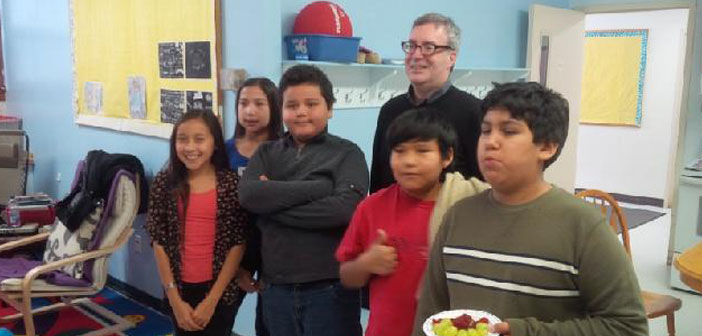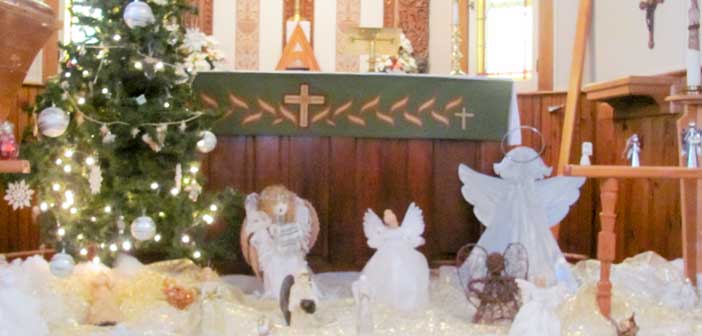WIKWEMIKONG—The Provincial Advocate for Children, Irwin Elman, was in Wikwemikong last Wednesday as part of his annual ‘listening tour’ just in time for the National Day of the Child on November 20, marking the 25th anniversary of the United Nations Convention on the Rights of the Child (UNCRC).
As part of this tour (to Ailsa Craig, London, Windsor, Belleville, Manitoulin, Thunder Bay, Perth and Ottawa), Mr. Elman sat down with a group of Grade 5 students from the Wasse-Abin Pontiac School, asking them their thoughts on “how we (the province) are living up to those promises we made to the children” under the UNCRC, Mr. Elman told The Expositor.
The provincial advocate noted the work Wikwemikong has done on creating its own Children’s Bill of Rights—the community’s own commitment to its children—which was passed by band council last year and witnessed by Mr. Elman at the official ceremony held at Wikwemikong High School. This kind of community Bill is totally unique in the province, he said.
“Chief (Duke) Peltier and his school opened their arms to us,” he continued. “I thought they would be reticent, me asking them big questions, but they were articulate, blunt, open, caring and I would even say precocious. We talked for at least an hour and when it was obvious they had more to say I promised to come back. I realize that what they were saying was so emotional, so instead of me filing a report I asked them to do their own report.”
“I thought ‘man, they’ve been through a lot that we can’t even begin to understand’,” he added.
Mr. Elman explained that every three years the premier has the responsibility of writing a report on how Ontario is keeping its promises under the UNCRC and presenting it to the federal government. He was horrified to learn, he shared, that the report was actually being written by a “low level lawyer” in the basement of the Ministry of the Attorney General who would send out an email to each of the ministries, asking them for updates on their work with children, collate the information and forward it on.
“I’m determined that, in two years, for the next report, this doesn’t happen,” he said.
Mr. Elman said he is also hoping to schedule a one-on-one with some of the children he meets and Premier Kathleen Wynne, including children from Wikwemikong, “so she can write her own report.”
One young woman shared her thoughts on the racism she encounters and of being second class citizens, pointing to nearby Assiginack Public School and its provincially funded classrooms as an example. “She used the word ‘discrimination’ and spoke of the aftermath of residential schools,” Mr. Elman continued. “I asked her when she became aware and she said ‘I can’t remember when I wasn’t’.”
When asked how to fix it, the students told him, ‘listen to us,’ ‘give us an opportunity,’ ‘let us help fix it’ and change the way history is taught in the schools. He was told that if First Nations history was taught the way it occurred then maybe there would be more of an understanding between all children “and that maybe the racism would be gone.”
“Children are filled with gems of wisdom,” the youth advocate said.
“I’m really impressed and my heart is full,” he added, following his Wikwemikong meeting.
Isaiah Manitowabi-Bell was one of the 10-year-olds that attended last week’s meeting with Mr. Elman.
“I felt very pressured, but felt relieved once I started talking,” he said. “I had a lot to say and they were very important people. I felt special to be picked, even though there’s a lot of other great Grade 5s.”
He said he shared his worries over the Children’s Aid Society (CAS) removing youth from the community, citing his own experience with a friend who lives in constant fear that if child protection is called one more time he faces being removed from his home.
Isaiah cited treaty rights and language as other worries that he and his friends experience.
“And we really need more funding because the school is old and falling apart,” he added. “There are buckets in the girls washroom because it is leaking.” His ultimate wish would be to have a “super school” that would combine the Junior, Pontiac and Wikwemikong High School together.
So moved was Mr. Elman by the stories of Wikwemikong’s youth he has pledged to come back in a month’s time and help them write their own report.
Adopted in 1989, the UNCRC changed how children were viewed and treated. The human rights treaty outlines the inalienable rights of every child in three key areas: provision, participation and protection. Today, the human rights treaty has been ratified by 194 countries, including Canada. To ensure that countries are living up to their commitments, they must periodically appear before the UNCRC to report on their progress.




